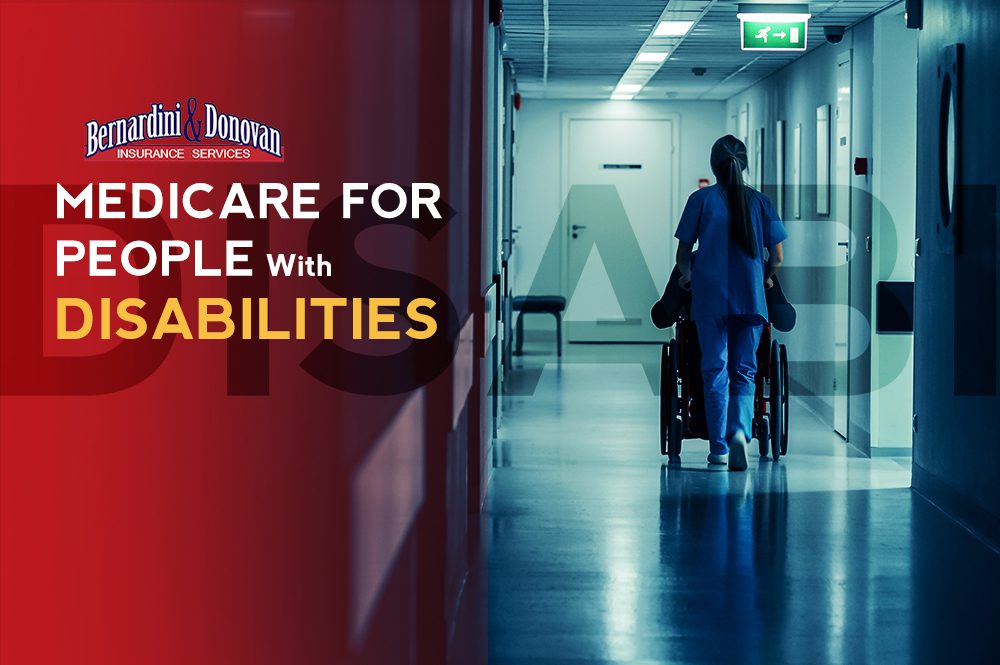Learn about how people under 65 with disabilities can benefit from Medicare insurance, plans, and more

If you’re under 65 (age 18 to 64) and have a disability, Medicare could benefit you in many ways if you meet the requirements to receive for Medicare disability coverage.
Medicare was established in 1965 as the health insurance program for Americans age 65 and over; since 1973, it has also covered people under age 65 who receive Social Security Disability Insurance (SSDI) benefits.
Medicare is tied to your eligibility for Social Security Disability Income (SSDI) benefits. (One exception is for people with end-stage renal disease (ESRD), who are automatically eligible for Medicare solely on the basis of having ESRD.)
Related reading(s): Medicare’s Role for People Under Age 65 with Disabilities;
MEDICARE ELIGIBILITY & COVERAGE
Medicare coverage is the same for people who qualify based on disability as for those who qualify based on age. For those who are eligible, the full range of Medicare benefits are available.
Coverage includes certain hospital, nursing home, home health, physician, and community-based services. The health care services do not have to be related to the individual’s disability in order to be covered. There are also no illnesses or underlying conditions that disqualify people for Medicare coverage.
If you’re under 65 and meet the following criteria, you could be eligible for Medicare:
-
Must have received Social Security Disability benefits for 24 months
-
Have End Stage Renal Disease (ESRD) or Amyotropic Lateral Sclerosis (ALS, also known as Lou Gehrig’s disease)
-
If you have Amyotrophic Lateral Sclerosis (Lou Gehrig’s disease), you can get Medicare the first month you get SSDI monthly income benefits.
-
If you have end-stage renal disease (ESRD), you can get Medicare within 3 months of your first dialysis treatment, regardless of whether you apply and qualify for SSDI. You are eligible for Medicare solely on the basis of having ESRD.
Medicare eligibility for working people with disabilities falls into three distinct time frames:
-
Trial work period, which extends for 9 months after a disabled individual obtains a job
-
Seven-and-three-quarter years (93 months) after the end of the trial work period.
-
Indefinite period following those 93 months.(See the statute at 42 U.S.C. § 422(c), and regulation at 20 C.F.R. § 404.1592).
Related reading(s): Medicare Coverage for People with Disabilities
Keep in mind that Medicare eligibility during each of these periods applies only while the individual continues to meet the medical standard for being considered disabled under Social Security rules.
It should also be noted that — after a beneficiary is determined to be disabled — there is a five month waiting period before a beneficiary can begin to collect Social Security Disability benefits.
People with ESRD and ALS, in contrast to persons with other causes of disability, do not have to collect benefits for 24 months in order to be eligible for Medicare.
FAQS ABOUT MEDICARE DISABILITY COVERAGE
Do I need to sign up?
People who meet all the criteria for Social Security Disability are generally automatically enrolled in Parts A and B.
People who meet the standards, but do not qualify for Social Security benefits, can purchase Medicare by paying a monthly Part A premium, in addition to the monthly Part B premium.
If you select the latter option, you automatically get Part A and Part B after you get one of these:
-
Disability benefits from Social Security for 24 months
-
Certain disability benefits from the RRB for 24 months
People who qualify for Social Security Disability benefits should receive their red, white, and blue Medicare card in the mail when the required time period has passed (3 months before your 25th month of disability).
If this does not happen or other questions arise, contact the local Social Security office.
I’ve earned income. Can I still receive Medicare health insurance?
Individuals who still have the disabling impairment but have earned income that meets or exceeds the “Substantial Gainful Activity” level can continue to receive Medicare health insurance after successfully completing a trial work period. Substantial Gainful Activity Levels can be found at http://www.socialsecurity.gov/oact/cola/sga.html.
Can I lose my SSDI benefits? How/Why?
The Social Security Administration periodically reviews eligibility for SSDI. If your condition improves or you have a successful kidney transplant, you can lose your SSDI benefits and Medicare (unless you also have another disability or chronic health condition that qualifies you for SSDI).
However, if you no longer qualify for SSDI because your condition improves or you successfully complete a trial work period, you may still be able to keep your Medicare benefits.
Federal legislation known as the Ticket Act allows a person with a disability who is eligible for Medicare and returns to work to keep his/her Medicare benefits (including free Part A coverage) for at least 8 1/2 years.
Are there any circumstances where a disabled individual isn’t eligible for Medicare?
Yes. An article published on the official California Health Advocates website states that many people with disabilities, including children, are not eligible for Medicare benefits because they do not have the work credits to qualify for SSDI benefits.
Children with disabilities and adults who are not eligible for SSDI are often eligible for Supplemental Security Income (SSI) benefits. People with SSI benefits are covered by Medi-Cal (California’s Medicaid Program), not Medicare.
For more information on SSI, check out this article.


